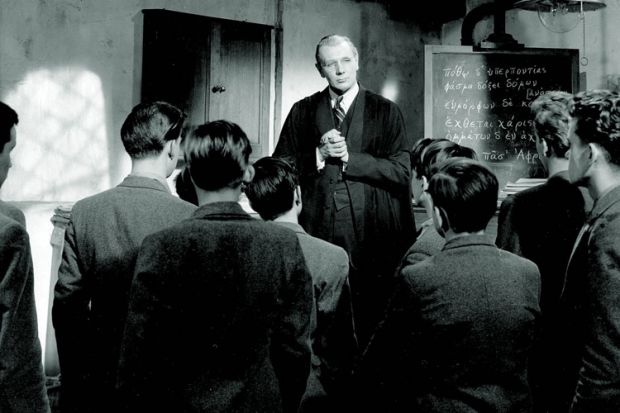Source: Kobal
Up close and personal: proponent points to improved student attainment
Marking undergraduate essays face to face with students helps to improve academic performance, a study indicates.
Instead of simply returning marked scripts to students, academics at Edinburgh Napier University invited first-year biomedical sciences students to sit with them while they assessed their work. With students in the room, tutors were able to explain more easily why they were awarding marks and which areas needed improvement, said Charlotte Chalmers, lecturer in biomedical science, who led the pilot study.
The 45 students who took part in the study last year achieved better-than-expected marks in their first-year examinations and higher grades than the rest of the 200-strong cohort who did not participate, Dr Chalmers said.
Students were also more satisfied with the course, particularly assessment and feedback – an area where universities score poorly compared with other aspects of university life. According to last year’s National Student Survey results, only 70 per cent of respondents were happy with assessment and feedback, while 86 per cent were satisfied with teaching.
“You are not just sitting at home in seclusion from students,” said Dr Chalmers. “You can take that 30 minutes you might spend on a piece of work and spend it with [them].”
Going through marking with students also allowed academics to relay positive feedback that they might not offer in written form, Dr Chalmers added.
“You are more likely to say positive comments than you are to write them down, where you might just put a tick,” she said.
Dr Chalmers, who hopes to involve more students in the scheme next year, believed the method would not be a significant drain on academics’ time.
“Setting up the meetings takes time, but marking does not take any longer,” she explained.
Some students were worried that they could be marked down unfairly if their tutor did not like them so chose not to take part in the pilot, said Dr Chalmers, who reported her findings at the Higher Education Academy’s annual conference, held at the University of Warwick earlier this month. However, those who did get involved said they were not worried about the lack of anonymity in the marking process (exam scripts are often identified only by number).
The scholar dismissed concerns that academics might feel pressured into awarding more generous marks if students were sitting in the room as grades were never up for discussion.
“If you lay down the ground rules beforehand, students understand the process,” she said.
Register to continue
Why register?
- Registration is free and only takes a moment
- Once registered, you can read 3 articles a month
- Sign up for our newsletter
Subscribe
Or subscribe for unlimited access to:
- Unlimited access to news, views, insights & reviews
- Digital editions
- Digital access to THE’s university and college rankings analysis
Already registered or a current subscriber? Login




